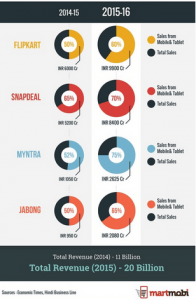In a first-of-its-kind move by an e-commerce player anywhere in the world, Myntra morphed into a mobile based retailer form on 15th, May 2015. The company which had already turned down the mobile version of its website, closed its website (even on computers/laptops) in an attempt to become a ‘mobile App-only’ retailer. Moreover, Flipkart, the parent company of Myntra, went ahead with a similar move in late march this year and pulled off its mobile website. If the tweets of Sachin Bansal, the co-founder & CEO of Flipkart, are anything to go by, Flipkart also plans to replicate the mobile app-only retailer if the experiment with Myntra becomes successful.

The Mobile Leap
The Internet and Mobile Association of India predicts that there will be 60.17% of all internet users in India will be mobile users by year end. The mobile user base has grown as much as by four times in the last three years. The prime drivers for a shift of consumers to ‘Mobile-only data access’ are believed to be the declining costs of connectivity and the speedy deployment of connectivity in emerging economies and developing countries.
So, why not keep mobile website ON? This is because there is an increased focus by the consumers & producers alike on Apps because mobile web-browsers are not-so-customer-friendly. Plus the consumers have a tendency to browse through a higher number of products & have better repeat purchase rates on a mobile-app as compared to mobile or desktop websites.
The Transition from E-Commerce to M-Commerce
The mobile channel is immensely facilitating growth in orders from non-metros cities. Tier II and Tier III cities in the country are an important market space for any online retail because of the absence of an organized retail sector.
The year 2014 saw billions of dollars being pumped into the Indian e-commerce business. Majority of the investment has gone into the growth of manpower, marketing and infrastructure. A major highlight of this investment is that almost all of the marketing money is being spent to develop the mobile base as India expects to double its base of mobile internet subscriptions and smartphones users by the 2015 year end. Thus, leading to rapid rise in numbers of ‘Mobile-Only’ and Smartphones users.
5 whys and wherefores m-commerce is the ‘Next Big Thing’
By going app-only, Flipkart will kill two birds with one stone. It will cut infrastructure costs and expand its market to cover all of India, in a quest to defeat Amazon. Here’s how.
1. Mobile is the unconquered frontier
You must have wondered as to why Facebook took over WhatsApp & that too for $19 Billion. Why are mobile payment platforms the preferred acquisitions of E-Commerce companies? The signs are there for all to see. The upcoming innovations are happening in the mobile platforms. And, thus, before any smart startup attempts to leverage the power and characteristics of the mobile platform and establish itself, Flipkart aims to grab the platform by the throat. In order to take full advantage of the mobile platform, Flipkart should be able to bring in benefits such as cash-less transactions, ability to run the app with minimum possible bandwidth, etc
.
2. Burgeoning smartphone penetration in India
As can be seen by the graphs, the smartphone user base in India is growing at an accelerated rate & is going to surpass US by 2016.
India will have about 200 million smartphone users by 2016, signaling a brave new world and plethora of opportunities for leading e-commerce, m-commerce players and digital entrepreneurs. Conceive 20 crore Indians endowed with a phone that connects them to the internet – bountiful chances for m-commerce.
3. Adds a personal touch!
Mobile phones are thoroughly personal, much more than desktops and laptops. Flipkart is aiming to make shopping a much more personalized experience by going the app-only way. It will make them have a way more targeted approach and at the same time enhancing the shopping experience for users with features like pre-logged in accounts, geo-tagging and personalized notifications on the basis of user history. Added benefits such as customized notifications for a new product launch or for price changes.
4. Promotes loyalty
Consumers in the Indian market are more likely to change loyalties & adherences on the basis of competitive prices. This is restricted to a great extent on mobile-based purchases as the peer comparison is a lot more difficult on a mobile-app than on desktops/laptops. Also, given the fact that the suggestions made on the app would be much more relevant & specific to the consumer, going mobile would ensure better click-throughs & a higher conversion rate. Thus, going ‘mobile-only’ will thrust forward more customers in the following lifecycle curve:
5. Puts an end to the loss of privacy at the discretion of browser owners
Browsers, especially Chrome, typically feed the companies that own them. It registers, records all the preferences of users and stacks them in the owners’ servers. Therefore, browsers are not always neutral and are generally, on the contrary, pro-owners. It analyzes a player’s customer base and later uses it to milk profits from them. It bodes well for e-commerce majors to realize and address this menace as early as possible. Android or other operating systems do not have the capability to analyze what is going on in their apps. Hence no source of data or insights on consumer base to outside parties and no longer the beguilement of jumping websites asking users to compare various products.
So, though the risk of data misuse is still there but its lot more restricted & you know well in advance what’s causing what.
What do market players have to say about it
The users are broadly dissatisfied with this decision, and have expressed their anger and frustration. After all, not each consumer wants to get ‘sticky’ with one app as comparing costs turns into a headache on a cellular app.
On a brighter side, not all e-commerce portals in India are emulating Flipkart and Myntra and the top three portals have overtly come out and guaranteed all their customers that their computing device version will continue to exist, along with cellular.
Strategically speaking, this is a massive morale booster for users of desktop/laptop variant of ecommerce portals, and at the same time, a tremendous demoralizer for Flipkart and Myntra’s advertising and marketing team, as they appear to have gone astray as of now.
We can’t force a consumer – Jabong
As the present development goes, even Jabong, biggest rival of Myntra, has admitted that 50% of all visitors and revenues originate on their cellular app and the contribution is growing. However whilst, they can’t force a customer to purchase by app alone. The customer is the best person to gauge whether or not they want a site or an app to make the purchase.
Praveen Sinha, co-founder of Jabong, mentioned that they firmly believe the buyers should have the ability to choose whether to purchase on his smartphone or on the laptop.
The might lies with the consumer – Amazon
Amazon has made clear that in an emerging and a price sensitive market like India, the decision making mandate has to be handed over to the customer. Although they admitted that almost 50% of their revenue are taking place on their cellular app, both internet site and cell must co-exist. Amazon sticks to its ideology of being a purchaser-obsessed company which enables its customers to buy whenever, wherever, and whatever s/he wishes to buy.
Respect laptop and desktop users – Snapdeal
Snapdeal has mentioned that their analytics knowledge indicates that there are tremendous quantity of laptop website users on their portal, and they just can’t abandon them.
A spokesperson from Snapdeal stated that they have stats to support the fact that many buyers use PCs to shop on-line & they do not wish to push their shoppers to use one certain medium to buy on.
Conclusion
The market is rife with both supporting & opposing views on being ‘mobile-only’ retailer. Thus, a lot remains to be seen on the basis of its impact on profitability & market share. The writers of the article tried to search for authentic data representing such a case study but as of now the e-comm & m-comm players are giving contradictory views.
In the conclusion, we would suggest that the e-commerce players should keep on experimenting with the ever-dynamic Indian Consumer which will lead them to a better strategy. As the Rama Bijapurkar, in her book ‘We Are Like That Only: Understanding the Logic of Consumer India’, states that the Indian Consumer shouldn’t be assumed to be going the same path as their western counterparts went in their consumerism. In a country with such a cultural, social & financial diversity, micro-segmenting is the best way forward.
References
1. http://www.ibtimes.co.in/myntra-sees-10-drop-sales-after-moving-app-only-format-633160
2. http://trak.in/tags/business/2015/05/18/amazon-snapdeal-jabong-refuse-flipkart-myntras-mobile-only/
3. http://www.huffingtonpost.in/dhritiman-hazarika/6-reasons-why-flipkarts-a_b_7800628.html
4. http://yourstory.com/2015/05/myntra-app-only-move-mobile/
5. http://trak.in/tags/business/2013/10/21/m-commerce-growth-india-30-snapdeal-sales-mobiles/
6. http://trak.in/tags/business/2015/03/23/flipkart-myntra-shut-mobile-websites-force-mobile-app-install/
7. http://www.huffingtonpost.in/deepak-abbot-/mobile-commerce-growth-in_b_6365236.html
[The article has been co-written by Akshay S. Gajghate & Harsh PramodDalmia. They are pursuing their MBA from IIM Shillong]
Tags: amazon flipkart M-commerce MyntraYou might like reading:

Redefining Life @ IIM Raipur
Every moment at some corner of the country there is someone dreaming of living a valuable and life defining moments in those temples where people from different backgrounds gets molded into future leaders of Corporate world. It was the same case with me till my dream came true on 14th June 2014 when I entered IIM Raipur Campus with loads […]

Building Alliances and Networks
The story so far… “Once upon a time, there was a kingdom called “Company”, whose King named CEO had three princes. They were named Prince Aggression, Prince Clever and Prince Agile .Each of them expected to be the future king and hence were always playing the game of oneupmanship. The king was deeply worried about the fate of his kingdom […]


































